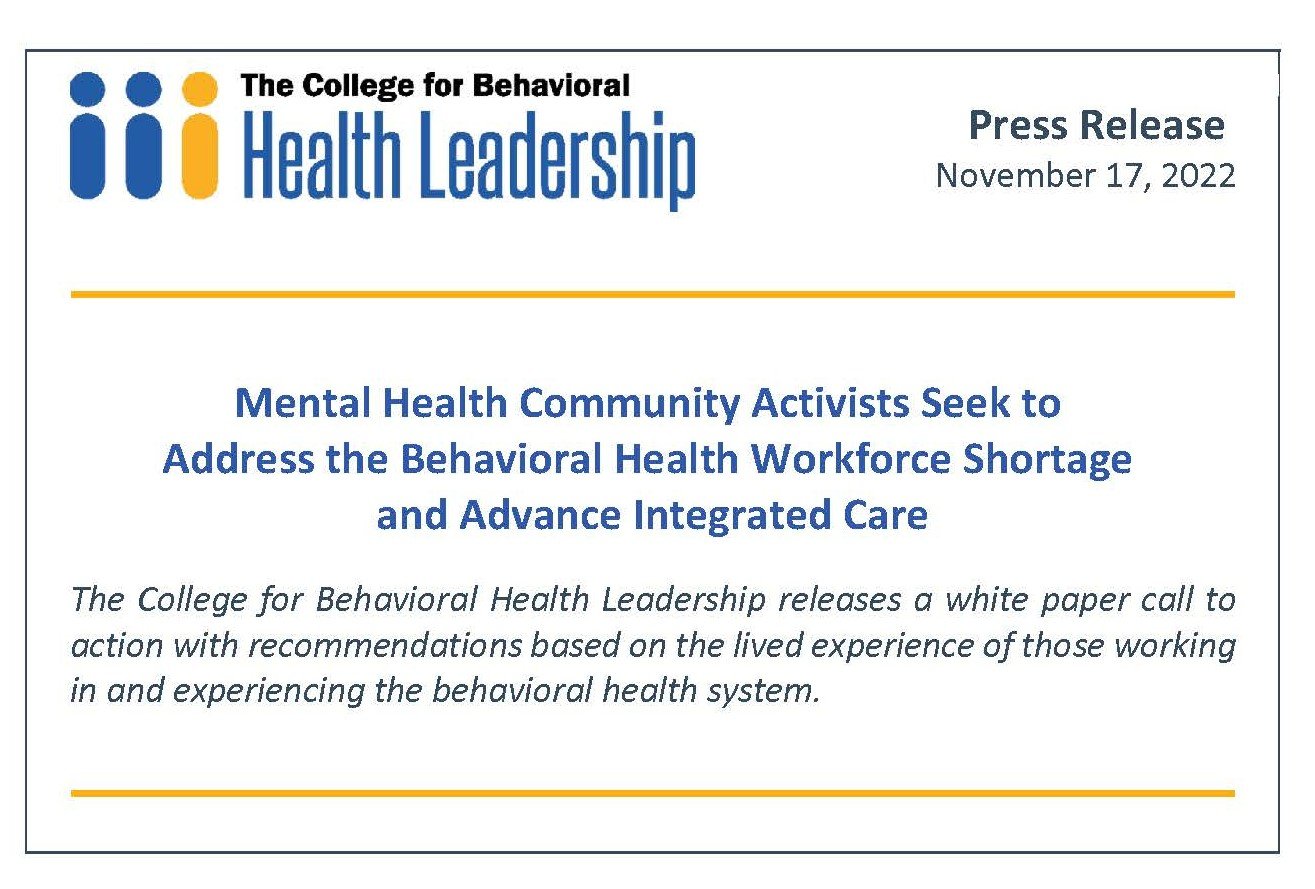NYAPRS Note: See below for details and a copy of recommendations that were released today by members of the College for Behavioral Health Leadership (CBHL) that are intended to bolster current proposals by the Biden administration and congressional subcommittees to address America’s behavioral health crisis, especially as regards our workforce crisis and the advancement of integrated care. These transformational strategies were developed under the leadership of Ron Manderscheid and should be grounded in equity and based on the lived experience of people receiving and delivering mental health and addiction related services and supports.
CBHL members reflect a diversity of experience, expertise, and perspective from organizations representing service users, service providers, community-based organizations, advocates, government, associations, and more. NYAPRS has been a long and strong supporter. I serve on their Board and am joined now by NYAPRS’ new Policy Director Luke Sikinyi in supporting this campaign.
Efforts currently are underway to address the behavioral health crises that have long existed, and which were made much worse by COVID-19. The urgency of these problems now is clearly in focus. The Administration, the federal agencies, and other organizations from around the country have prioritized mental health and are working to fix the broken system.
The Ad Council estimates that about half the population report a mental health condition, and less than half are seeking help[1]. Suicide is at its highest level and still rising[2]. Drug death rates have risen dramatically[3]. And children are experiencing many behavioral health problems.
The American Rescue Plan expanded community mental health services and suicide prevention programs[4]. Now, the Biden Administration is proposing a ten-year $100 billion plan to expand the behavioral health workforce and connect people to a continuum of care[5]. Fiscal Year 2023 appropriations are being considered now.
But history tells us that mental health services are vulnerable to the winds of politics. Whim, belt-tightening, elections, oversight — any one of these can interrupt the best of intentions.
To prevent delays implementing the quality behavioral health programs needed by all Americans – friends, neighbors, family members — The College for Behavioral Health Leadership (CBHL) is enlisting all who care about behavioral health reform in its call to action.
Since 1979, CBHL has made mental health reform a priority. Today, they are releasing recommendations you care about that our federal and state elected officials need to hear. Legislators, office holders, need to learn what you want, what your family seeks, what your neighbors need.
“Today, only one in four persons with behavioral health conditions actually receive needed care. This tragic situation affects families, communities, and our entire country. We can and must take action today to build our national behavioral health capacity. Please help.” Ron Manderscheid, PhD, nationally recognized behavioral health leader, CBHL member.
These recommendations were developed by CBHL members, who reflect a diversity of experience, expertise, and perspective from organizations representing service users, service providers, community-based organizations, advocates, government, associations, and more. They are intended to bolster current proposals by the Biden administration and congressional subcommittees to address America’s behavioral health crisis.
“People who come to the Behavioral Health field come to help others. Our challenge as leaders is to ensure these caring people can deliver services in healing community environments.” Christopher Zubiate, DHA, MSW, President & CEO, Ever Well Health Systems.
The current spotlight on behavioral health reform is an opportunity to think differently about wellness. Despite broad support from the White House and Congress, success requires actual legislation and funding. Transformational strategies should be grounded in equity and based on the lived experience of those receiving and delivering behavioral health care.
“Our government must act now to position peer workers to play key roles in the successful engagement and support of people in crisis in ways that will prevent avoidable admissions, incarcerations, homelessness, overdoses and suicide.” Harvey Rosenthal, CEO of the New York Association of Psychiatric Rehabilitation Services (NYAPRS), Board member of the College for
Behavioral Health Leadership.
“Tell your legislators the most effective and appropriate way to achieve those aims is to fund more programs with trained peer supporters and other workers who look, live and speak like the people they serve.” NYAPRS Public Policy Director Luke Sikinyi
CBHL implores all people passionate about behavioral health reform to call and write their national and state representatives to ensure legislation and funding appropriations consider these critical factors as major, transformational investments are made in the behavioral health system.
The white paper, letter templates, and other resources can be downloaded here.
Access the White Paper and Other Resources
If you have questions or would like more information, please reach out to Holly Salazar, CEO of the College for Behavioral Health Leadership, at hsalazar@leaders4health.org or call 888-304-8455.
[1] The Advertising Council. (2022). The state of mental health from the voice of America. https://talk.crisisnow.com/wp-content/uploads/2022/11/86-Ad-Council.pdf
[2]Substance Abuse and Mental Health Services Administration. (2022). Preventing suicide. https://www.samhsa.gov/suicide#:~:text=According%20to%20the%20latest%20research,level%20and%20is%20still%20rising
[3] Centers for Disease Control and Prevention. (2021). Drug overdose deaths in the U.S. top 100,000 annually.https://www.cdc.gov/nchs/pressroom/nchs_press_releases/2021/20211117.htm
[4] Substance Abuse and Mental Health Services (2022). HHS announces nearly $35 million To strengthen mental health support for children and young adults. https://www.samhsa.gov/newsroom/press-announcements/20220309/hhs-announces-35-million-strengthen-mental-health
[5] The White House. (2022). Biden-Harris administration highlights strategy to address the national mental health crisis. https://www.whitehouse.gov/briefing-room/statements-releases/2022/05/31/fact-sheet-biden-harris-administration-highlights-strategy-to-address-the-national-mental-health-crisis/
